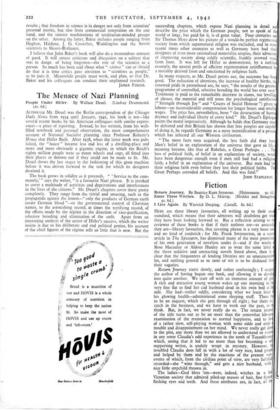The Menace of Nazi Planning People Under Hitler. By Wallace
Deuel. (Lindsay Drummond. 12S. 6d.) ALTHOUGH Mr. Deuel was the Berlin correspondent of the Chicago Daily News from 1934 until January, 1941, his book is not—like several recent books by his American colleagues with similar experi- ences—a piece of reporting. Instead, he has written, from his well- filled notebook and personal observation, the most comprehensive account of National Socialist planning since Professor Roberts's House that Hitler Built. After 1938, when the latter work was pub- lished, the " house " became less and less of a dwelling-place and more and more obviously a gigantic engine, in which the Reich's eighty million people were so many wheels and cogs, all fitted into their places or thrown out if they could not be made to fit. Mr. Deuel shows the last stages in the fashioning of this great machine before it was driven forward to the task for which its designers destined it.
The book grows in solidity as it proceeds. " Service to the com- munity,' " says the writer, " is a favourite Nazi phrase. It is invoked to cover a multitude of activities and deprivations and interferences in the lives of the citizens." Mr. Deuel's chapters cover these pretty completely. They range from the trivial and amusing, such as the propaganda against the lemon—" only the products of German earth create German blood "—or the governmental control of Christian names, to the astonishing record, at times the terrifying record, of the efforts made by the regime in the direction of race-purification, selective breeding and elimination of the unfit. Apart from an interesting analysis of the secret of Hitler's success, which the writer insists is due to his deliberate and real political genius, his account of the chief figures of the regime tells us little that is new. But the succeeding chapters, which expose Nazi planning in detail describe the price which the German people, not to speak of the world at large, has paid for it, is of great value. Four centuries ag Sir Thomas More drew his picture of a would-be perfect regiment society from which supernatural religion was excluded, and in more recent times other countries as well as Germany have had their designers of even more rationalised materialist utopias, their advocates of improving society along coldly scientific, frankly avowed stud- farm lines. It was left for Hitler to demonstrate, by a ruthles example, the mortal perils of efficient regimentation uninfluenced by a morality derived from and sanctioned by religious faith.
In many respects, as Mr. Deuel points out, the outcome has bee, good. The reduction of abortions, the increase of healthy births, the renewed pride in parenthood are, he says, " the results of the greatest programme of controlled, selective breeding the world has ever seen' Testimony is paid to the remarkable decrease in slums, tne levelling of classes, the material and still more the psychological satisfaction (" Strength through Joy " and " Courts of Social Honour ") given labour—no inconsiderable compensation for longer hours and smalle, wages. The price has, nevertheless, been " the destruction of human decency and individual liberty of every kind." Mr. Deuel's Epilogu points the moral impressively. Although he holds that Germany mus be defeated and that Britain has shown that free peoples are capable of doing it, he regards Germany as a mere intensification of a process which has infected all our Western civilisation.
" The more facts men acquired, the less faith did they have. Men's belief in an explanation of the universe that gave-to life i meaning became, like that of Rabelais, a Great Perhaps. . . . loss of political faith, of belief in an explanation of society, wo have been dangerous enough even if men still had had a religion% faith, a belief in an explanation of the universe. But men had los their religious faith even before they lost their political faiths. hid Great Perhaps corroded all beliefs. And this was fatal."
JOHN STAPLETON.


























 Previous page
Previous page